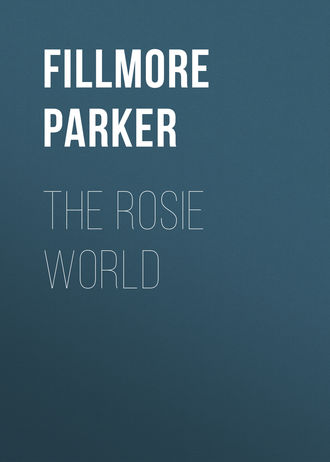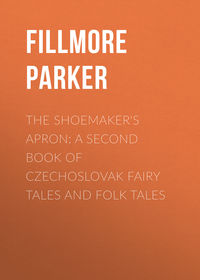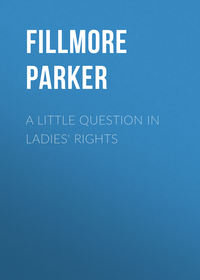 полная версия
полная версияThe Rosie World
George was breathing with difficulty. "I'd like to get at that Hawes fellow for about five minutes! Will he be in his office tomorrow, around noon?"
Ellen wrung protesting hands. "No, George, you won't do any such thing! I won't let you! You'll only get pulled in! Besides, he was right! Leastways, he was in some things! Of course I knew what he was always hinting about but honest, George, I didn't know the rest!"
"What didn't you know?"
"I didn't know my work was so bad that he'd been getting it done over every day! I know I'm pretty poor at it. I know perfectly well why I was never able to keep a job. But he kept saying that I suited him just right and I was such a fool that I thought I did… And, George, we were having supper at one of those sporty places out on the Island. I knew it wasn't a nice place, but I thought it was all right because I had an escort. And he kept talking louder and louder until the people at the other tables could hear and they began laughing and joking. Then some one shouted, 'Throw her out!' and I got so frightened I could hardly stand up. I don't know how I got away. And, George, I hadn't enough money in my bag for a ticket on the boat and some man gave me a dime…"
The car went on with scarcely a stop the whole way out. Occasionally the motorman looked back, inquisitive to know what the matter was but too far away to hear. Some time before they reached the end of the route, Ellen had finished her story. The recital relieved her overwrought feelings; her sobs quieted; her tears ceased. By the time they alighted from the car, her manner had regained its usual composure.
She and Rosie waited outside the office until George had made out his accounts and deposited his collections. Then all three started home.
For half an hour Rosie had not spoken. Neither of the others knew this, for Ellen, of course, had been too engrossed in herself, and George too engrossed in her, to notice it. Rosie was with them but not of them. She walked beside them now close enough to touch them with her hand but feeling separated from them by worlds of space. Her heart was like a little lump of ice that hurt her every time it beat. She waited in a sort of frozen misery for what she felt sure was coming. At last it came.
"George," Ellen began. There was a note of soft pleading in her voice that Rosie had never heard before. "Oh, George, I wonder if you'll ever forgive me for the way I've been treating you?"
"Aw, go on!" George's words were gruff but their tone fairly trembled with joy.
"I mean it, George," Ellen went on. "I've been as many kinds of a fool as a girl can be and I'm so ashamed of myself that I can hardly talk."
"Aw, Ellen," George pleaded.
"And I've been horribly selfish, too, and I've imposed on ma and Rosie here until they both must hate me." Ellen paused but Rosie made no denial. "And I've treated you like a dog, George, making fun of you and insulting you and teasing you. And, George, of all the men I've ever known you're the only one that's clean and honest right straight through. I see that now."
Ellen began crying softly, making pathetic little noises that irritated Rosie beyond measure but were like to reduce George to a state of utter helplessness.
"Aw, Ellen," he begged, "please don't talk that way!"
But Ellen wanted to talk that way. She insisted on talking that way. Her pride had been dragged in the dust but, by this time, she was finding that dust, besides being choking, is also warm and friendly and soothing. Enforced humiliation is bitter but, once accepted, how sweet it is, how comforting! Witness the saints and martyrs, and be not surprised that Ellen O'Brien finally acknowledged as true all the charges her late admirer had made. The fact was he had been too gentle with her! She was worse, far worse than even he had supposed. She didn't see how any one could ever again tolerate the mere sight of her!
"Oh, George, how you must hate me!" she murmured brokenly.
"Hate you!" George protested breathlessly. "Why, kid, I'm just crazy about you!"
Rosie, listening, caught her breath sharply. Her phrase, which she had laboured hard to teach him! But where had he got the deep vibrating tone with which he spoke it? Rosie had never heard that before.
After a moment, Ellen quavered: "Even – even yet, George?"
"Even yet!" George cried in the same wonderful voice that sent little thrills up and down Rosie's back. "Why, Ellen girl, don't you know that ever since the first day I saw you you've been the onliest girl for me!"
His arm was around her now, straining her to him, and Rosie knew, but for her own presence, he would be kissing her.
"I – I don't see why, George."
"But it's so, Ellen, it's so!"
They walked on a few moments in silence. Then George began soberly: "Of course, Ellen, you know I'm only a farmer and you know you've always said you'd never live in the country."
"George, don't remind me of all the foolish things I've said! Please, don't! Why, if I could go to the country this minute, I'd go and never come back! I hate the city! I wish I'd never have to see it again!"
George gasped an incredulous, "Really, Ellen? Do you really mean it?"
"Yes, really!" Ellen declared vehemently and George, untroubled to account for this sudden revulsion of feeling, threw up his head with a joyous laugh.
When they reached home, George said to Ellen: "Don't you want to sit out here on the porch a little while?"
Nobody invited Rosie to stay. She hesitated a moment, then said primly: "Good-night, everybody."
"Good-night," they chorused politely, as they might to any stranger.
Rosie started in, then turned back. "And, Jarge, I forgot to tell you about Monday afternoon. I'm sorry I can't go with you but Tom Sullivan invited me first."
"That so?" George said, and from his tone, Rosie knew that he didn't understand what she was talking about. Worse still, he wasn't interested enough to find out.
Rosie dragged herself slowly upstairs. In the bedroom, when she felt for matches, she discovered that her hand was still clutching the note which George had given her earlier in the evening. She read it again by the light of the candle. "… Say, kid, I'm just crazy about you!.." Jackie turned over in his sleep and Rosie hastily blew out the candle for fear he should open his eyes and see her tears.
She groped her way to bed in the dark and wept herself miserably to sleep.
CHAPTER XXXV
ELLEN MAKES AN ANNOUNCEMENT
The next morning at breakfast Ellen declared herself. She addressed her mother, but what she had to say was for the whole family.
"I just want to tell you, Ma, I'm done with stenography forever. 'Tain't my line and I know it and I should have known it long ago. Now you needn't argue because that's all there is about it."
Mrs. O'Brien looked at Ellen blankly. "Why – why, Ellen dear," she stammered, "what's this I hear you saying?"
Ellen repeated her announcement slowly and distinctly.
"But, Ellen," Mrs. O'Brien protested, "how can you talk so and the beautiful way you've been getting on and the beautiful way Mr. Hawes has been treating you? And what will Mr. Hawes say – poor, kind-hearted gentleman that he is! Oh, Ellen dear, with your fine looks and your fine education I beg you not to throw it all away!"
Mrs. O'Brien mopped her eyes with her apron and pleaded on. It did not occur to her to ask the reason for Ellen's sudden decision. After all, sudden decisions were merely characteristic of Ellen. Terence, however, peered at his sister sharply.
"Huh! Seems to me stenography was all right yesterday! What's happened to make you change your mind? Did that Hawes fellow say something to you last night at the Island?"
Ellen had decided that the family were not to know the details of the previous night's adventure and, before they came down in the morning, she had pledged Rosie to secrecy. Yet some sort of explanation had to be offered. She looked at Terry now with a candour that was new to her and that did much to win his support.
"Terry," she began slowly, with none of her usual aggressiveness, "you always thought my going to that business college and trying to do office work was foolish. You've said so all along. I didn't use to believe you were right but I do now. I'd never do decent office work in a hundred years. I'm sorry all the money you and dad had to put up and I'll pay you back if I can."
"Gee!" murmured Terry in astonishment, "you sure must have got some blowing up to make you feel that way about it!"
"Well, that's the way I do feel," Ellen said quietly.
"But, Ellen," Mrs. O'Brien wailed, "you don't mean it – I know you don't! Why, what'll you do if you throw up this fine position with Mr. Hawes? Nowadays a girl can't sit at home and do nothing! She's either got to work or get married." Mrs. O'Brien paused with a new idea which her own words suggested to her. "Is it – is it that you're getting married?"
Ellen spoke quickly: "Ma, I expect to work and I'm going to work. But I'm going to do something I can do well."
"That you can do well!" echoed Mrs. O'Brien. "I don't rightly catch your meanin', Ellen. Here you've landed a fine position and your boss is a nice friendly gentleman and now you're turning your back on it all to take up something else! I don't understand you at all, at all! And to think," Mrs. O'Brien concluded brokenly, "of the skirts and shirtwaists that I've stayed up all hours of the night to iron for you, just to keep you lookin' sweet and clean down at that office!"
"Ma, I'm sorry to disappoint you – honest I am. But, don't you see, it's just this way: I've made a bad mistake and the sooner I get out of it the better it will be for me. What I ought to do is something I can do."
"Something you can do, indeed! And will you tell me, me lady, what is it you can do so much better than stenography?"
Ellen flushed but answered firmly: "I can trim hats."
"Trim hats!" screamed Mrs. O'Brien. "What's this ye're sayin'? Do you mean to tell me that you're willing to be a milliner when you might be a stenographer? Why, anybody at all can go and be a milliner!"
"Anybody can't be a fine milliner. And you needn't think there isn't good money in millinery. The head of a big millinery department gets a couple of thousand a year!"
Mrs. O'Brien blinked her eyes. "Has some one been offering you that kind of a position?" Her tears ceased to flow. Once again she beamed on Ellen with all her old-time pride. "Ah, Ellen, you rogue, you're keeping something back! Come, tell me what's happened!"
Ellen sighed helplessly. "Ma, I'm trying to tell you, but you make it awful hard for me. You go off every minute and don't give me a chance to finish."
Mrs. O'Brien folded her hands complacently. "Ellen dear, I won't utter another syllable – I promise you I won't. Now tell me in two words what's happened."
"Well, Ma, it's this: I'm through with stenography and I'm going in for millinery, which I think I can do better."
"But where, Ellen, where are you going in for it? That's the great p'int!"
"I'm going to try Hattie Graydon's aunt first. She always says that not one of the girls in her shop begins to have the taste that I've got, and one time she told me if ever I wanted a job to come to her."
The happy look in Mrs. O'Brien's face slowly faded. Tears again filled her eyes. "And is that all you've got to tell me?"
"Yes, Ma, that's all. I'm going down to see Miss Graydon this morning."
"Oh, Ellen, Ellen, to think of your doing a thing like that without asking the advice of a soul! You're a foolish, headstrong girl!"
Ellen dropped her eyes. "George Riley thinks I'm doing right."
Mrs. O'Brien looked up sharply.
"Jarge Riley indeed! And may I ask what Jarge Riley's got to with it?"
"George and me are friends again. I thought I better tell you."
In Mrs. O'Brien amazement took the place of grief. "Ellen O'Brien, do you mean to tell me that you've took up with Jarge Riley when you might have had a gentleman like Mr. Hawes?"
The flush that her mother's words excited was one of anger as well as embarrassment. "Ma, you listen to me: I've never once told you that I might have Mr. Hawes! You've made that up yourself!"
"Made it up myself, indeed! when he's been taking you out night after night and treating you like a real lady!"
"And what's more," Ellen went on vehemently, "George Riley's worth twenty Philip Hawses!"
Mrs. O'Brien looked at her sharply. "Is it that you're going to marry Jarge Riley?"
Ellen, breathing hard, made answer a little unsteadily: "Yes."
Mrs. O'Brien dropped back limply into her chair. "Mercy on us!" she wailed, "and is this the end of your fine looks and your fine education – to marry a farmer like Jarge Riley! Why, you could have had him without any business college or nothing!"
Ellen stood up and Mrs. O'Brien, her face woe-begone and tragic, made one last appeal: "Ellen O'Brien, I ask you in all seriousness, are you determined to throw yourself away like that?"
Ellen was nothing if not determined. "I'm going down to Miss Graydon's now," she said in a casual tone which ended all discussion; "and me and George will probably get married in the spring."
CHAPTER XXXVI
THE HAPPY LOVER
It was several days before Mrs. O'Brien regained her usual complacency. "'Tain't that I've got anything against you, Jarge," she explained many times to her prospective son-in-law. "I'm really fond of you and I treat you like one of me own. But what with her fine looks and her fine education I was expecting something better for Ellen. Why, Jarge, she ought to be marrying a Congressman at least. Now I ask you frankly, don't you think so yourself?"
For George the situation was far from a happy one. To be the confidant of Mrs. O'Brien in this particular disappointment was embarrassing, to say the least. Moreover, certain of Mrs. O'Brien's objections were somewhat difficult to meet and yet they had to be met and met often, for Mrs. O'Brien harped on them constantly.
"And, Jarge dear, if you do go marry her and carry her off to the country, what will you do with her out there? Tell me that, now! For meself I can't see Ellen milkin' a cow."
George tried hard to explain that milking cows was not the only activity open to a farmer's wife; that, in all probability, Ellen would never be called on to milk a cow. His protests were vain, for, to Mrs. O'Brien, milking a cow stood not so much for a definite occupation as for a general symbol of country life. George might talk an hour and very often did and, at the end of that time, Mrs. O'Brien would sigh mournfully and remark: "Say what you will, Jarge, I tell you one thing: I can't see Ellen milkin' a cow."
Moreover, life with Ellen was not at once the long sweet song that George had expected. Not that she was the old imperious Ellen of biting speech and quick temper. She was not. All that was passed. She was quiet now, and docile, anxious to please and always ready for anything he might suggest. Would she like a street-car ride tonight? Yes, a street-car ride would be very nice. Or the movies or a walk? She would like whatever he wanted. Her gentleness touched him but caused him disquiet, too, because he could not help realizing that a great part of it was apathy. One thing pleased her as much as another, which is pretty nearly the same as saying one thing bored her as much as another.
"But, Ellen," he protested more than once, "you don't have to go if you don't want to!"
"Oh, I want to," she would insist in tones that were far from convincing.
George could not help recalling the eager joy with which Rosie used to greet each new expedition. Why wasn't Ellen the same, he wondered in helpless perplexity. He went through all the little attentions which Rosie had taught him and a thousand more, and Ellen received them with a quiet, "Thanks," or a half-hearted, "You're awful kind, George."
"Kind nuthin'!" he shouted once. "I don't believe you care one straw for me or for anything I do for you!"
His outburst startled her and, for a moment, she faltered. Then she said: "I don't see how you can say that, George. I think you're just as good and kind as you can be."
"Good and kind!" he spluttered. "What do I care about being good and kind? What I want is love!"
"Well, don't I love you?" She looked at him beseechingly and put her hand on his shoulder. Her caresses were infrequent and this one, slight as it was, was enough to fire his blood and muddle his understanding.
"You do love me, don't you?" he begged, pulling her to him, and she, as usual, submitting without a protest, said, yes, she did.
A word, a touch, and Ellen could always silence any misgiving. But such misgivings had a way of returning, once George was alone. Then he would wish that he had Rosie to talk things over with. He was used to talking things over with Rosie. For some reason, though, he never saw Rosie now except for a moment when she handed him his supper-pail each evening at the cars. At other times she seemed always to be out on errands or on jaunts with Janet and Tom Sullivan. George looked upon Tom as a jolly decent youngster and he was pleased that the intimacy between him and Rosie was growing. But at the same time he could not help feeling a little hurt that Rosie should so completely forget him. True, he was bound up heart and soul in Ellen and now he was her accepted lover. That, it seemed to him, ought to be happiness enough and he told himself that it was enough. Then he would sigh and wonder why he wasn't as light-heartedly gay as he used to be when he and Rosie went about together. Rosie, apparently, had entirely forgotten what good chums they once had been. Well, after all, he couldn't blame her, for she was only a child.
George did not know and probably never would know that Rosie was watching him and watching over him with all the faithfulness of a little dog and that she knew all there was to know of the situation between him and Ellen.
George had set the latter part of September as the time for his return to the country. For four long years he had been working and saving for this very event. Several times before he had been about to leave but always, at the last moment, some untoward circumstance had crippled his finances and he had been forced to stay on in the city another few months. Now for the first time he could go and now he was loath to go. But he had made his announcement and all his little world was standing about, waiting to see him off and to bid him god-speed.
He was ashamed to acknowledge even to himself the indecision that was tugging at his heart. "Don't you think, Ellen," he ventured at last, "it might be just as well if I waited till Christmas?"
"Oh, George!" Ellen looked at him with a shocked expression. "I don't see how you can say such a thing after the way you've been waiting all these years! Besides, what would your poor mother say if you didn't come now that you could? You've told me yourself how the burden of things has fallen on her more and more and how anxious you are to relieve her."
"I know," George acknowledged; "but, Ellen girl, don't you see I can't bear to leave you now I've got you. I've had you for such a little while!"
"Won't you have me just the same, even if you are in the country? Besides, you'll be getting things ready for me by spring."
George took a sharp breath. "But I want you now!"
Ellen looked at him gravely. "See here, George, there's no use talking that way. You've got to work and I've got to work, and if we don't get our work done this winter it'll be all the worse for both of us when spring comes. Your father's expecting to hand over the management of the farm to you this fall and it's up to you to take it. Ain't I right?"
George sighed. "I suppose you are."
"Then don't be foolish. Besides you can come down and see me at Thanksgiving."
George gasped. "Why, Ellen, I expect to see you before that! I could come in and stay over Sunday 'most any week."
"No, George, you mustn't do that! I won't let you!" Ellen spoke vehemently. "It would only cost you money and you know perfectly well you need every cent of cash you've got! Once you're back in the country you won't be getting in three dollars a day ready money. No! You'll come to see me Thanksgiving and not before."
Ellen was right. It would be necessary for him to hoard like a miser his little stock of money until the farm should once again be on a paying basis.
George sighed gloomily and went about his preparations for departure.
CHAPTER XXXVII
THE SISTERS
Ellen and Rosie saw him off. Rosie wept openly.
"And, Jarge," she said, kissing him good-bye, "give your mother and your father my love, but especially your mother. Tell her that I love her and that I think of her every day. You won't forget, will you? And tell her that Geraldine is fat and well and has been ever since we got home from the country."
"Good-bye, George," Ellen said quietly. Her face was pale and there was a strained expression about eyes and mouth.
"Oh, Ellen!" George gave her one last wild kiss and rushed madly through the gate.
His coach was far down the train shed and Rosie and Ellen soon lost sight of his hurrying figure. They stood together at the gate and waited until the train started.
As it pulled away Ellen sighed deeply. "Thank goodness he's gone!" She leaned against the grating and laughed hysterically.
Rosie, who had been dabbing her eyes with a wet handkerchief, looked up blankly. "Ellen O'Brien, what do you mean? Are you glad he's gone?"
"You bet I'm glad!" Ellen's silly high-pitched laugh continued until silenced by Rosie's look of scornful fury.
"Ellen O'Brien, you're worse than I thought you were!"
Ellen faltered a moment, then reached toward Rosie appealingly. "Don't be too hard on me, Rosie. You don't know the awful time I've had. I feel like I've been dead. I haven't been able to breathe. I don't mean it was his fault. I think as much of him as you do – really I do. He's good and he's kind and he's honest and he's everything he ought to be. But if he'd ha' stayed much longer I'd ha' smothered."
Rosie, accusing angel and stern judge rolled into one, demanded gravely: "And now that he's gone what are you going to do?"
"What am I going to do?" Ellen's laugh was still a little beyond her control, but it had in it a note of happy relief that was unmistakable. "I'm going to live again – at least for the little time that's left me."
"What do you mean by 'the little time that's left you'?"
"From now till Thanksgiving; from Thanksgiving till spring." For an instant Ellen's face clouded. Then she cried: "But I'm not going to think of spring! I'm going to have my fling now!"
Rosie looked at her without speaking and, as she looked, it seemed to her that the Ellen of other days rose before her. It was as though a pale nun-like creature had been going about in Ellen's body, answering to Ellen's name. Now, at George's departure as at the touch of a magic wand, the old Ellen was back with eyes that sparkled once again and cheeks into which the colour was returning in waves. Yes, she was the old Ellen, eager for life and excitement and thirsting for admiration. But the old Ellen with a difference. Now, instead of estranging Rosie utterly with careless bravado, she strove to win her understanding.
"You don't know how I feel, Rosie; you can't, because you and me are made differently. You're perfectly happy if you've got some one to love and take care of – you know you are! With me it's different. I don't want to take care of people and work for them and slave for them. I want to have a good time myself! I'm just crazy about it! I know I ought to be ashamed, but can I help it? That's the way I am. Do you think I'm very awful, Rosie?"
Rosie answered truthfully: "I'm not thinking of you at all. I'm thinking of poor Jarge."
Ellen gave a sigh of relief. "Thank goodness I can give up thinking of him for a while." She began patting her hair and arranging her hat. "Do I look all right, Rosie? I got to hurry back to the shop. A feather salesman is coming today and Miss Graydon wants me to take care of him. He'll probably invite me out to lunch."
"And are you going?" Rosie asked slowly.
Ellen took a long happy breath. "You bet I'm going!"






